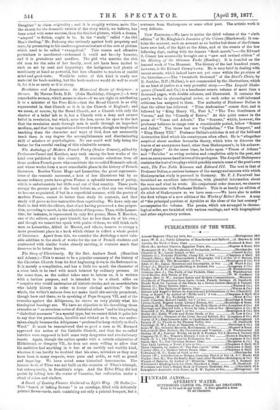NEW EDITIONS.—We have to notice the third volume of the
"sixth. edition" of Mr. Kinglake's Invasion of the Crimea (Blackwood). It con- tains the account, such an account as no battles but those of the Crimea have ever had, of the fight at the Alma, and of the events of the few following days, ending with the famous "flank march."—Sir Edward S. Creasy has seasonably brought out a "new and revised edition" of his History of the Ottoman Turks (Bentley). It is founded on the learned work of Von Hammer. The history of the last hundred years, however, is Sir Edward Creasy's own. He is very brief in dealing with recent events, which indeed have not yet come within the province of the historian.—The "twentieth thousand" of the Devil's Chain, by E. Jenkins, M.P. (Mullen), is not commended by the illustrations, which do no kind of justice to a very powerful story.—The Leopold Shake- speare (Cassell and Co.) is a handsome octavo volume of more than a thousand pages, with double columns, and illustrated. It contains the poet's works in chronological order, or such order as well-informed criticism has assigned to them. The authority of Professor Delius is that the editor has followed. "Titus Andronicus " comes first, and is followed by "King Henry VI., Part I.," "The Two Gentlemen of Verona," and the 'Comedy of Errors." At this point comes in the poem of "Venus and Adonis?' The "Sonnets," which, however, the professor believes to range over a considerable period, follow "Romeo and Juliet." The three last are " Cymbeline," "The Tempest," and "King Henry VIII." Professor Delius's criticism is not of the bold and destructive kind which his countrymen often affect. He is "altogether sceptical about another favourite theory, which tries to discover the traces of an anonymous hand, other than Shakespeare's, in his acknow- ledged plays." At the same time, he looks upon " Timon of Athens" and " Pericles " as owing revision and completion only to the poet, and sees an anonymous hand in two of the prologues. The Leopold Shakespeare contains the text of two plays which possibly contain some of tho poet's own work, The Two Noble Rinsmen and Edward III. The text is that of Professor Delius, a curious instance of the energy and success with which Shakespearian study is pursued in Germany. Mr. F. J. Farnivall has furnished an excellent introduction, with plentiful information about the man and what he wrote. His conjectural order does not, we observe quite harmonise with Professor Delius's. This is as handy an edition of the whole of Shakespeare as we have seen.—We have also to notice the first volume of a new editionof the Works of Robert Burns. Amap of "the principal portions of Ayrshire at the close of the last century"' accompanies the volume. The poems, which are arranged in chrono- logical order, are furnished with various readings, and with biographical. and other explanatory notices.


































 Previous page
Previous page